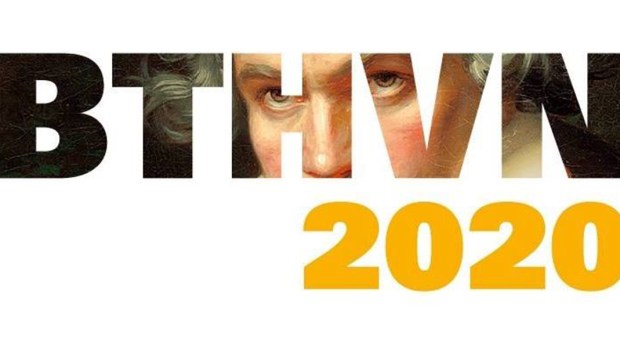Germany and Austria are preparing for a year-long string of events to honor the 250th birthday of Ludwig Van Beethoven, one of the Western world’s greatest and most prolific composers. The activities will be centralized in the German city of Bonn, where Beethoven was born, and the Austrian city of Vienna, where the composer spent most of his life and composed the majority of his works.
The event will proceed under the moniker BTHVN2020. DW reports that each of the 5 letters in the logo corresponds with a German word for five key aspects of the composer’s character: Beethoven as a citizen, as a composer, a humanist, a visionary and a nature lover. Coordinators refer to these as “pillars” of Beethoven, and events are expected to bring these themes into their presentations.
The celebration kicked off on December 16, but the first “Special Event” will be a New Year’s Eve concert from the Wiener Philharmoniker (The Vienna Philharmonic) that will feature Beethoven’s music. This is to be followed by a performance of his 9th Symphony on New Year’s Day. Concerts and presentations will continue for the remainder of the year, and can be explored on the official website of the celebration.
As a Christian, Beethoven had a curious faith. It is known that he did not attend church regularly, yet he composed some of the most glorious music the Church was ever gifted. According to Caltech.edu, Beethoven was enamored with “true church music,” which he considered to be the musical styles of early Church composers like Palestrina.
Beethoven was acutely interested in the perfection of prosody — the patterns of rhythm and sound used in poetry — which he found in Psalms and hymns of the Church, and he displayed a fascination with the texts of the Mass. Although he spent relatively little time in the pews, Beethoven’s own writing demonstrates the respect that the composer held for a devout faith.
Beethoven believed that faith was something that should be inspired wherever you are. When he wrote his Missa Solemnis, Beethoven was asked if he intended the work to be performed in a church or in a concert hall, to which the composer responded:
“My chief aim was to awaken and permanently instill religious feelings not only into the singers but also into the listeners.”
Another example of Beethoven’s active Christian faith can be seen in his writings from 1801. Ludwig had fallen in love with a woman, but their affections were prohibited because she was of a higher social class. After dedicating his “Moonlight Sonata” to her, he wrote:
“No friend have I. I must live by myself alone; but I know well that God is nearer to me than others in my art, so I will walk fearlessly with Him.”
While Beethoven seemed to have an aversion to Church events, his faith was steadfast and he carried it with him wherever he went. This faith would fuel his creativity and lead the esteemed composer to write music that is still enjoyed by the Christian world today.

